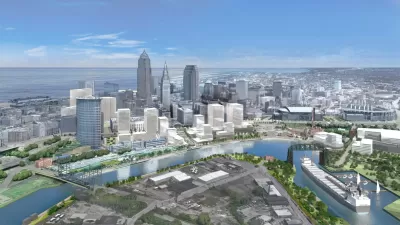To substantiate their big budgets, big projects promise big results. But the inherent time, complexity, and deal-making required to complete such projects is fertile ground for incompetence and corruption; or isn't it? A new study investigates.
"[T]he list of hectored mega-projects goes back years, all around the world: The Chunnel, The Big Dig, bullet trains in Japan and China," observes Anthony Flint. "The price tag is typically the number one concern, but so is the rationale, the usefulness, the promised economic development returns, and on to many other themes including the design, the execution, and the maintenance. There is an assumption as well that corruption works its way into all modern-day public works."
"But is that what happened?" asks Flint. In examining 30 case studies of $1 billion-plus mega-projects worldwide, a new study [PDF] by Harry Dimitriou, director of the Omega Centre at the Bartlett School of Planning at University College London, and his colleagues "found that most mega-projects were actually close to being on time and on budget."
"But the team looked well beyond the 'iron triangle' of fulfilled schedule, budget, and specifications — and indeed that is the major takeaway from the report: Big projects need to be judged for how they meet objectives over time, amid shifting societal, political, and environmental values."
FULL STORY: Are Mega-Projects Really As Bad As Everyone Says?

Maui's Vacation Rental Debate Turns Ugly
Verbal attacks, misinformation campaigns and fistfights plague a high-stakes debate to convert thousands of vacation rentals into long-term housing.

Planetizen Federal Action Tracker
A weekly monitor of how Trump’s orders and actions are impacting planners and planning in America.

In Urban Planning, AI Prompting Could be the New Design Thinking
Creativity has long been key to great urban design. What if we see AI as our new creative partner?

King County Supportive Housing Program Offers Hope for Unhoused Residents
The county is taking a ‘Housing First’ approach that prioritizes getting people into housing, then offering wraparound supportive services.

Researchers Use AI to Get Clearer Picture of US Housing
Analysts are using artificial intelligence to supercharge their research by allowing them to comb through data faster. Though these AI tools can be error prone, they save time and housing researchers are optimistic about the future.

Making Shared Micromobility More Inclusive
Cities and shared mobility system operators can do more to include people with disabilities in planning and operations, per a new report.
Urban Design for Planners 1: Software Tools
This six-course series explores essential urban design concepts using open source software and equips planners with the tools they need to participate fully in the urban design process.
Planning for Universal Design
Learn the tools for implementing Universal Design in planning regulations.
planning NEXT
Appalachian Highlands Housing Partners
Mpact (founded as Rail~Volution)
City of Camden Redevelopment Agency
City of Astoria
City of Portland
City of Laramie





























